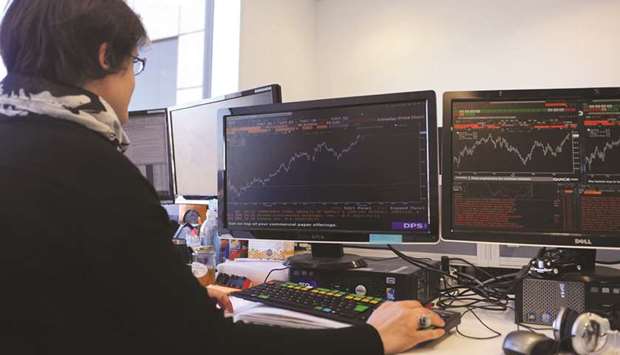US and European stock markets diverged yesterday at the end of a tumultuous week fraught with fear of geopolitical tensions, escalating following Donald Trump’s exit from the Iran nuclear deal.
The US president’s announcement on Iran on Tuesday had triggered a surge in oil prices unseen in over three years.
By yesterday, however, oil prices pulled back some, with analysts seeing the risk of escalation in the tinderbox Middle East easing.
Traders meanwhile welcomed below-forecast US inflation data on Thursday that dented expectations for a sharp lift in US interest rates, buoyed by the prospect of continued cheap borrowing.
“Global equity markets have attempted to trade cautiously higher at the end of the week, as a combination of soft US inflation figures, stronger commodity prices and slightly easing geopolitical tensions seems to have had a small impact on risk sentiment,” wrote Lukman Otunuga, research analyst at FXTM.
In the US, the Dow and S&P 500 pushed higher, with analysts at Charles Schwab saying the markets were “tacking onto a solid weekly gain that has been bolstered by recent cooler-than-expected inflation data”.
As the week drew to a close Europe’s main stock markets ran out of steam in an “uninspired” performance amid a dearth of economic data, dealers said.
London stocks rose 0.3% to 7,724.55, while France and Germany declined somewhat.
“Equities are mixed as we approach the end of the trading session, but broadly speaking it has been a positive week for European stocks,” said CMC markets UK analyst David Madden.
“Traders are gradually becoming more confident in the markets as geopolitical fears have subsided a little,” he said.
London’s FTSE 100 has recovered from its February slump and is now less than 100 points below its record high set in mid-January.
Frankfurt’s DAX 30 was down 0.2% at 13,001.24 and Paris’ CAC 40 lost 0.07% at 5,541.94 at close yesterday.
This week’s oil price rally faltered yesterday after recent surges that followed Trump’s Iran decision and data showing improving US demand.
However, both main contracts remain close to peaks not seen since November 2014 and there is still talk of further rises to around $80 a barrel.
An exchange of rockets between Israel and Iran was also keeping traders wary of a flare-up in the volatile crude-producing Middle East region, with the Syria crisis still raging.

A trader works at the London Stock Exchange. The FTSE 100 rose 0.3% to 7,724.55 points yesterday.
